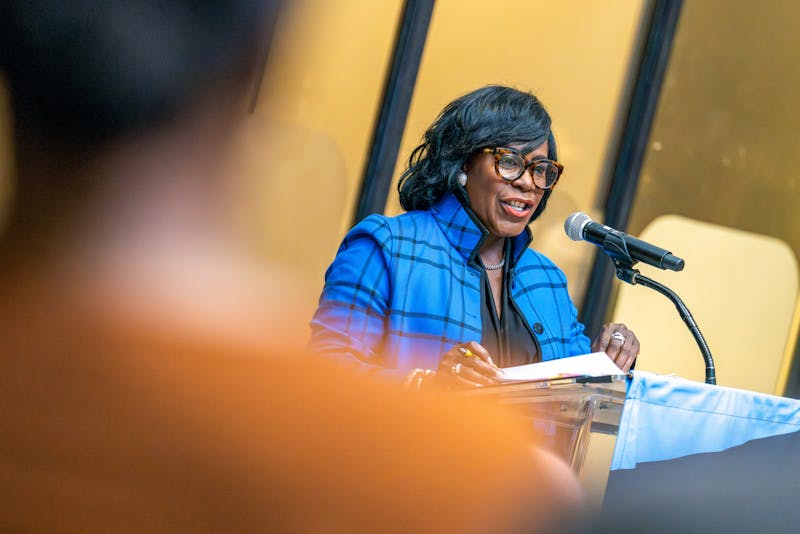
Lexi Boccuzzi writes that "until we are each willing to take accountability and change our behavior, we will continue to see the media and political polarization."
Credit: Ana GlassmanI expected to be watching the first presidential debate with my classmates at Penn this election cycle, but instead I found myself at home with my family in Connecticut. I, like many of the 73 million Americans, who tuned in to the debate, was concerned, frustrated, and discouraged by what I saw. However, I think the most disconcerting part was that I wasn’t surprised by their behavior.
So my question for you becomes, how did we get to this point? Well I think it’s fair to say that neither candidate was immune from making disparaging claims or spewing misinformation. Therefore, placing blame on one party or another is a relatively weak argument. That assumption often leads people to blame those in politics as a whole, citing the skewed clickbait headlines from the media and the 35 day government shutdown of 2019 as evidence of this polarization.
Nevertheless, I think we must ask ourselves do we feed into this divisiveness? Opinion polling highlights the self-proclaimed American distaste for the rhetoric. Penn President Amy Gutman citing a specific statistic in last week’s Silfen Forum on the topic saying “prior to the pandemic 7/10 Americans, an overwhelming majority, called incivility in the public sphere a major problem”. Yet, the skyrocketing ratings on some of the major and certainly more polarized news networks would say otherwise. We would be lying to ourselves if we said we weren't captivated by the absurd political events filling our social media pages and television screens each day. In the same way that the United States of Entertainment adores reality TV, we have begun treating our political discourse like an episode of the Real Housewives.
I recognize that we often expect our politicians to be held to a higher standard than their voters. Every journalist has noted thousands of times in the last four years the lack of “presidential decorum” embodied by the current president, and yet how can we have these expectations for our politicians when we fail to hold ourselves to the bare-minimum standards. As Governor Jeb Bush addressed at the Silfen Forum, “Politics is a mirror of our culture and this a cultural phenomena not a Trump phenomena...We have changed as a nation, we are less civil.” I think the same logic holds true in regards to the political climate as a whole.
Our role in promoting this divisiveness is even more clear when we look at the Vice Presidential debate from two weeks ago. As most people who watched the debate did, I found solace in the poise and respect that each of our Vice Presidential candidates embodied particularly in light of the behavior of their fellow ticket members. Both Senator Harris and Vice President Pence were not immune from the typical debate adversarial antics; it would be unfair to characterize their behavior as anything other than reasonable and well-mannered. However without fail, the following morning I saw countless posts with misleading soundbites and videos substantiating labels of VP Pence as misogynistic and Senator Harris as condescending. I would doubt that most of the people reposting these claims had actually watched the debate, yet I was still struck by the fact that the problem didn’t seem to be the politicians but how we responded to them.
The Penn community is also not immune to the draw of incivility. Representatives from the Penn Democrats and Penn College Republicans engaged in an online debate over Facebook Live in an effort to discuss the merits of both of their parties’ respective candidates. Rather than acknowledge the debaters’ arguments, the audience chat was filled with individuals personally attacking their character. The comments became so inappropriate that one of the moderators had to stop the debate in an effort to tell people to remain respectful and avoid personal attacks. He cited the courage it takes to defend your political beliefs in front of your peers. He even ironically claimed that as Penn students we didn’t want to behave as the Penn affiliates did in the presidential debate.
In no way is this a uniquely negative reflection of Penn in comparison to its peer institutions. In fact, events like the 2020 Silfen Forum: Civil Discourse in Uncivil Times, with a bipartisan panel of speakers discussing political topics in a peaceful manner represent stellar examples for our student body. However, even in listening to the forum I was startled by the lack of personal accountability on the part of the panel for their role in fueling polarized discourse.
We often fall victim to finger-pointing, whether it be at the opposing party, those in power, or even our neighbors on Facebook rather than acknowledging the integral role we play in participating in this environment. We live in a representative democracy, and as a result our leaders are a reflection of who we are. Thus, the reality becomes that until we are each willing to take accountability and change our behavior, we will continue to see the media and political polarization. If we don’t want to sit through another egregious presidential debate, we need to turn off partisan news networks, vote out politicians who disparage their colleagues and refuse to reach across the aisle, and stop engaging in uncivil discourse with our fellow citizens.
I’m with Kenny Chesney when I ask myself the question: “Can’t we all get along?”
LEXI BOCCUZZI is a College first-year student studying Philosophy, Politics and Economics. Her email address is abb628@sas.upenn.edu.
The Daily Pennsylvanian is an independent, student-run newspaper. Please consider making a donation to support the coverage that shapes the University. Your generosity ensures a future of strong journalism at Penn.
Donate






